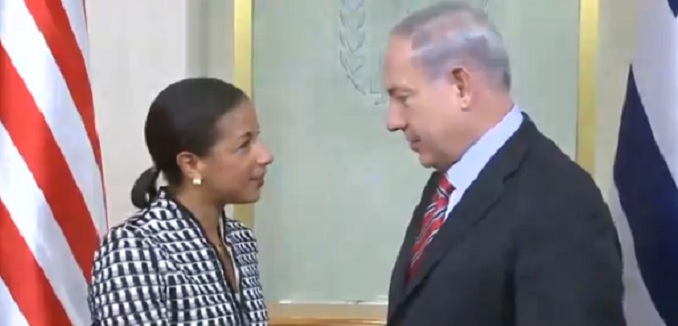National Security Advisor Susan Rice arrived in Israel for consultations with top Israeli security and political figures on Wednesday. The White House had clarified that the planned discussions would focus significantly on negotiations between Iran and the P5+1 global powers over the former’s atomic program, but also that – per language used by Reuters – would not actually yield “any new developments on that front.”
Israeli Prime Minister Benjamin Netanyahu, for his part, reiterated long-standing positions on what is widely considered to be an Iranian drive to acquire nuclear weapons:
“Iran seeks to destroy the State of Israel and builds atomic bombs for that purpose,” Netanyahu said. “I want to reiterate Israel’s position: We think that Iran must not have the capacity to make atomic bombs. Iran today has thousands of centrifuges, thousands of kilograms of enriched uranium to make a bomb. A bad deal would let them keep those capacities. It’s better to have no deal than a bad deal.”
Israel is demanding that Iran be denied any enrichment capacities to ensure that it not have the capability to manufacture a bomb. The US and the rest of the P5+1 – Russia, China, Britain, Germany and France – have reconciled to Iran retaining some uranium enrichment capabilities.
Earlier, the Post suggested that Rice’s trip comes as Washington is preparing for what the outlet described as an “Israeli backlash” to a range of concessions that the Obama administration is rumored to be contemplating:
Prime Minister Binyamin Netanyahu fears Iran will be left with more of a nuclear capability than the world will want to admit, at the whim and under the watch of a United Nations agency he does not trust, no longer under the yoke of sanctions designed to cripple the program.
The Israelis have among other things dismissed an Iranian proposal – which top figures from Tehran’s atomic program have been hyping as a promising development in the talks – that would see the Iranians rejecting a long-standing Western demand that they dismantle or at a minimum downgrade the heavy water reactor being constructed at the country’s Arak facility.
The current IR-40 reactor will be able to produce at least one bomb’s worth of plutonium per year, and once activated is functionally impossible to destroy. The Iranians have rejected any possibility of meeting their international obligations – codified in United Nations Security Council Resolutions – to halt construction at Arak and keep the reactor offline.
They have also drawn a red line against modifying it into a more proliferation-resistant light water model.
Instead they are offering to run the reactor at less than full capacity, a compromise that Israeli Intelligence and Strategic Affairs Minister Yuval Steinitz pointed out would leave Tehran steadily stockpiling plutonium that could eventually be used to construct a nuclear weapon, albeit at a slightly slower pace.
Negotiators from the P5+1 and Iran are set to meet next week in Vienna.
State Department deputy spokesperson Marie Harf expressed confidence that a final deal would be reached this summer:
The Obama administration says that nothing is agreed to until everything is settled: primarily, the large-scale dismantlement of infrastructure in Iran’s nuclear program with no feasible civilian nuclear purpose.
“We’ve talked about all the issues in the first three rounds,” State Department deputy spokeswoman Marie Harf told reporters on Tuesday.
“We can already see some areas of agreement, or at least where there’s a path forward, and have been very clear about where there will be tougher negotiations ahead. But we do feel like we can start drafting and do feel like we can get this done by July 20.”
[Photo: PressTV News Videos / YouTube]




